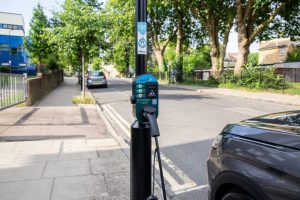BYD commissioned research showing more than 36% of UK residents aged 18-34 would prefer learning to drive in an electric vehicle rather than a petrol or diesel car.
The Chinese manufacturer surveyed over 2,000 people across the country through OnePoll. The study examined public attitudes toward EV driver training and whether charging infrastructure matches growing interest levels.
EV adoption has shown positive momentum across the UK since early 2025.
April 2025 saw electric vehicle sales increase 8.1% year-on-year, with 24,558 new registrations recorded.
According to the BYD research, Belfast showed the highest interest levels – 40% of respondents said they’d prefer learning in an EV. The city has just 54 chargers per 100,000 residents, revealing a significant gap between enthusiasm and available infrastructure.
Wrexham in Norfolk ranked second with 32% of learner drivers preferring EV training. Infrastructure remains limited there too, offering 33.2 chargers per 100,000 residents.
London completed the top three areas with 19% of respondents choosing EVs over internal combustion engine vehicles for driver training.
Despite lower interest percentages, the capital provides 765.2 chargers per 100,000 residents – making it one of the UK’s most charger-dense regions.
Brighton and Hove saw 17% of respondents favor obtaining their licence in an EV. Chelmsford and Portsmouth followed closely at 16% each.
Birmingham, Glasgow, and Leicester each recorded 14% interest levels. Norwich rounded out the top 10 cities at 13%.
Infrastructure Challenges Despite Growing Interest
Steve Beattie, BYD UK’s sales and marketing director, said the findings indicate positive EV adoption among younger demographics.
“Our research shows that younger drivers, especially Gen Z and Millennials, are really embracing electric vehicles. Their interest in learning to drive in EVs is driven by a mix of excitement for new technology and a desire to make more environmentally conscious choices.”
Beattie highlighted infrastructure investment needs in high-demand areas with limited charging options.
“The findings also highlight the need for more investment in charging infrastructure, particularly in places like Belfast and Wrexham, where demand for EVs is high but charging options are still limited. At BYD, we’re committed to helping drive this transition to zero-emission mobility with cutting-edge EV technology.”
The company expects EVs will play an expanding role in driver education as the UK approaches its 2035 zero-emission vehicle target.
“As the UK heads towards its 2035 target for zero-emission vehicles, EVs will play a much bigger role in driving education. Driving schools will need to continue supporting this shift by adding EVs to their fleets, keeping up with the growing interest from learners.”
BYD has experienced strong performance in 2025, outselling Tesla in European markets last month. The manufacturer continues expanding its UK presence while supporting the transition to sustainable mobility solutions.





